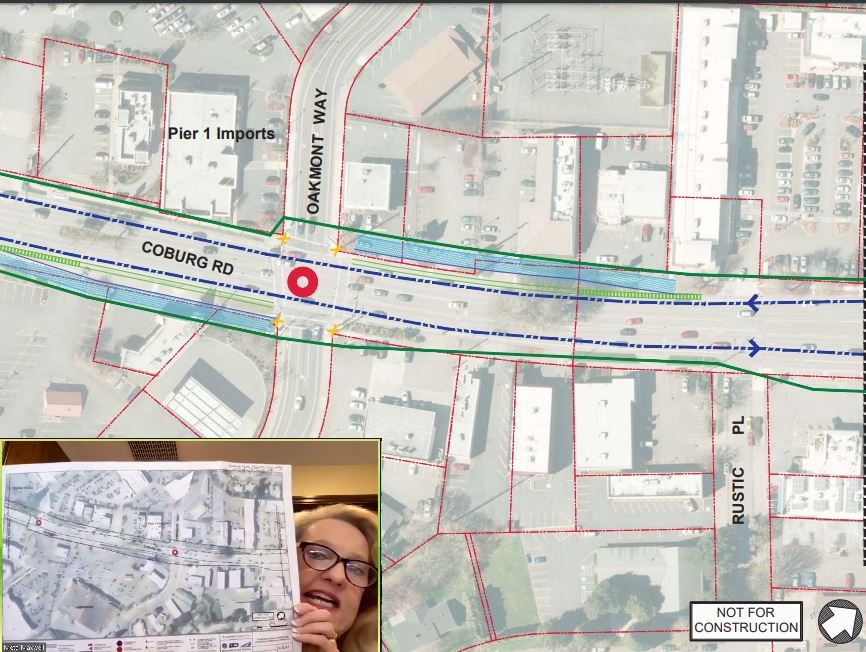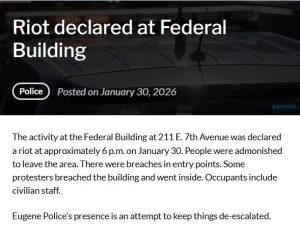Citizens go door-to-door on five corridors, collect 500+ petitions urging City, LTD to reject EmX
6 min read
Meta Maxwell said most people are shocked to see the detailed concept maps for MovingAhead.
Three dedicated local citizens hope to stop a plan for more EmX buses on major corridors. They say that LTD has only shown the public a glossy brochure. Most people are shocked when they see the concept plans.
[00:00:13] Meta Maxwell: This is what they’ve been showing publicly, a 30-page brochure of Moving Ahead with alternatives and essentially a poster board with a line on it. What people don’t know is that they actually hired CH2M Hill, a big engineering firm, to review those five corridors and to come up with detailed plans of what these alternatives would look like.
[00:00:43] When I saw it, and what it would do to my building—which is taking out parking and signage—I told them it was completely unacceptable and they said, well, I only had another month, less than that to make comment, because they were going to vote on them.
Thank you for supporting
local civic journalism
[00:00:58] And I took that plan across the street to all the other businesses that I could see that were going to be adversely affected and none of them have been consulted on the plans. There are 197 pages of these detailed plans for all of the corridors that showed mass taking of private property— residential and business property— for these buildouts. I went out on the corridors, talked to all the people that were shown and no one had been shown them.
[00:01:28] Not only do the plans not appear to make any sense and be unaffordable, but also the public engagement that they’ve claimed has not occurred in any meaningful way. It has not been transparent and they have not been shown the actual plans.
[00:01:45] John Q: The project, called MovingAhead, looked at five major corridors. One dedicated citizen went door-to-door along all of them.
[00:01:54] Mark Osterloh: I actually walked up and down each side of each of the corridors, asking people to sign a petition saying they opposed these plans. I knocked on every business and house directly on the corridors. And I got incredible responses from these people. Well over 95% of the people had no clue whatsoever that these plans existed and when affect their properties. When I showed them copies of what they were planning to do, they were absolutely stunned. They were really burnt when it came to River Road, where they were planning to take two lanes of car traffic only leaving one lane each way, and to turn those into bus-only lanes, and they were saying the traffic jams there would be absolutely incredible.
[00:02:43] John Q: In an echo of Eisenhower’s famous speech, Mark reminded citizens: ‘Beware the transit-industrial complex.’
[00:02:50] Mark Osterloh: Those big buses have to have very strong foundations in the road, otherwise they’ll tear up the roads. So that makes more money for the construction people.
[00:02:59] It looks very much like the road construction people and the bus manufacturers have their people hiding in the background, paying lots of money to push these plans so they’ll make lots of money and big tax bills for us.
[00:03:13] And will it make things better for us? No, it’ll actually make things worse. Make the congestion worse and force you to walk six blocks in the rain for Grandma to get on the bus, to go get groceries and then back, and then maybe even have a bus transfer. They’re not dealing with reality. They’re dealing with how they can make the most money and sock us with the tax bill.
[00:03:32] John Q: Pointing out the scope of the citizens’ public engagement effort, Charlie Rojas.
[00:03:37] Charlie Rojas: We have about approximately 500 petitions that are vehemently against the EmX. One guy, one man, doing it on his own has been able to figure out just how much these plans antagonize people, how much people are against this. This has been a remarkable display of democracy in actual practical application. The city of Eugene and the population of Eugene owe a lot to these folks.
[00:04:03] At least 152 of those signatures come from businesses, which is the backbone of this economy. I’ve been talking to quite a number of people along the River Road / Santa Clara area, mostly focusing on small businesses who had not seen any of this. Small businesses would lose signage, parking, and most importantly, customer access into the small, you know, landholders along the corridor. They did not know the extent of the destruction that would be taking place.
[00:04:28] This is the worst economic downturn in Oregon history. And even prior to that, in 2017, 21% of households in Eugene and 20% of households in Springfield had incomes below the poverty level. That was five years ago. What do you think it is now? And you’re not going to take into consideration the cost and how impactful and how destructive this is going to be on the small businesses that are struggling in this town right now? To me, that’s outrageous.
[00:04:55] John Q: The citizens said they favor better transportation plans, but not the massive amount of concrete needed for heavy buses.
[00:05:03] Meta Maxwell: Bus rapid transit was really designed for large cities in South America, and they’ve been riddled with problems even there. They’ve been demonstrated to not work in the city of our size and economic and demographic profile.
[00:05:22] And with the large buses that they’re ordering, they’ll require special infrastructure. Well, if instead of those big buses, we size the buses to the ridership, you don’t have to build all of that expensive new infrastructure. Instead, you can do things like the few pullouts that are needed, you know, to get them out of the lanes of traffic.
[00:05:46] We’re not against having responsible transportation plans. We need them. What we really need is a holistic plan for Eugene that includes some point-to-point activity and sized buses for the routes and recognizes that since 2015 when these were conceived, we’ve got an increase in alternative transportation means. Mass transit nationally has been going down since 2012 in ridership. People now can ride electric vehicles, there’s more RideShare options, Lyft and Uber are converting to carbon- neutral fleets, we’ve got Arcimoto here in town. There’s many, many options coming up. And MovingAhead is not taking that into consideration.
[00:06:40] Charlie Rojas: I live here in the River Road/Santa Clara area, and they would have their meetings you know, conducted by the city. Now I didn’t go to every single one of them, but I can tell you that the ones that I did go to never showed any of these plans that CH2M Hill had devised.
[00:06:56] And the reason (as Mark said) they didn’t want public engagement is because most people would say: ‘Are you out of your mind? Of course, I don’t want this. It’s not necessary.’ They would ask the same question that all of us are asking: ‘Who is actually riding these buses?’ I mean, there’s a lot of virtue invocation about how safe they are, how green they are. But it doesn’t mean anything unless people actually ride the bus, you have paying customers that actually are willing to help maintain that bus line, including the EmX.
[00:07:22] Mark Osterloh: When I was going up and down each of the corridors, I saw an incredible number of buses going by and empty buses where the rule, if there were one or two buses, one or two passengers in the bus, hey, that was a pretty good load. It was amazing. So I think Charlie made a comment, the EMX should be called ‘The Empty X.’ That would be more appropriate.
[00:07:45] Charlie Rojas: Since 2011, I pretty much have given up my car, and so my form of transportation is walking or public transportation. Twice a day, morning and evening. I take the EmX through the Glenwood Springfield loop past two schools. past multiple apartments and condominium complexes, pass by a major mall, Gateway Mall, and International Way, and of course the hospital. If in fact the EmX was efficacious, that should be full. It should be jammed with people. And it is not. They’re not. I can tell you that they’re not, I ride this thing all the time and I’m telling you that they’re empty. It has been a waste of money. Get on the EmX (through the Glenwood Springfield loop) and ride it for a few days, ride it for a month, see for yourself whether or not any of the promises that were made about ridership have been fulfilled. I challenge anybody to go, you know, jump on the bus and check for yourself.
[00:08:37] John Q: Three dedicated citizen activists hope to stop elected officials from adopting the staff recommendation. The City Council meets March 14th, and LTD on March 16.




